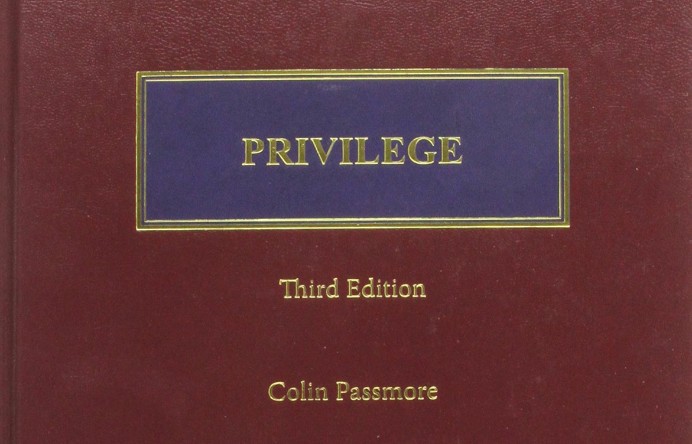Firstly, we would like to congratulate Karen Marsh from RG Solicitors, who won our recent Legalex prize draw. Congratulations Karen, £100 Amazon vouchers are on their way to you!
In this issue, we have some concerning developments in the law of privilege and a raft of disciplinary decisions to share. Then we can all finish early, right?

Legal Professional Privilege – the beginning of the end?
A recent SFO case has sparked concerns over the erosion of litigation privilege in financial crime investigations and beyond. The case involves a demand from the SFO for documents relating to an internal investigation into allegations of fraud, bribery and corruption raised by a whistle-blower. The Defendant claimed that litigation privilege attached to the documents. Sitting in the High Court, Mrs Justice Andrews stated that privilege would only apply if the documents were prepared solely for conducting litigation and if criminal prosecution was ‘anticipated’. The court held that the documents were not prepared solely for this purpose and documents, including correspondence, interviews and working papers by solicitors and forensic accountants must be handed over to the SFO.
Why is it important?
Litigation privilege is a key part of the legal professional privilege (LPP), which itself is central to the administration of justice and the trust in legal services. It ensures that clients can obtain legal advice in confidence. Although this case relates to financial crime investigation, it potentially has far reaching consequences to the basic principle of LPP. The Law Society has already described the ruling as ‘alarming’.
It’s likely that the ruling will be appealed.
Professional misconduct standard of proof
On the 2nd May the Bar Standards Board announced that it was launching a consultation into the standard of proof applied for barristers facing disciplinary proceedings. The current standard of proof, as in the SDT, is the criminal one (‘beyond reasonable doubt’). Concerns have been raised by the regulators that this is different to most other professional bodies, where the civil standard (‘on the balance of probabilities’) applies. It is widely known that the SRA is also keen to make similar changes, and the outcome of the BSB’s consultation could embolden them further.
Why is it important?
In theory the civil standard makes professional misconduct convictions easier for the regulators. However, the conviction rates very high (somewhere around 90%), which suggests that this is a solution to a problem that does not exist.
The sanctions that follow a successful prosecution are significant, often career-ending and the profession is likely to resist any move to lower the standard of proof.
You and your regulator
The SDT recently handed down judgement in the case of Alan Birbeck, a solicitor with 17 years post qualification. He was struck off by the SDT after it concluded that he failed to advise the SRA about his bankruptcy, misled police officials, acted dishonestly, borrowed money from a vulnerable elderly client and failed to reply to correspondence from the SRA requesting an explanation for his actions.
Why is it important?
This is almost a full house of misconduct. The dishonesty alone would probably have resulted in the disgraced solicitor being struck off:
“Save in exceptional circumstances, a finding of dishonesty will lead to the solicitor being struck off the roll’ – SRA v Sharma [2010]
But we highlight this case because of the ‘lesser’ findings. First, that he failed to notify the SRA of his bankruptcy and, secondly, that he failed to reply to the SRA’s correspondence. Chapter 10 of the Code of Conduct deals with the relationship between you and the regulator and there is an overriding requirement to comply with the regulator. There is also a core Principle that you must ‘deal with your regulators and ombudsmen in an open, timely and co-operative manner’. Outcome 10.3 states ‘you notify the SRA promptly of any material changes to relevant information about you including serious financial difficulty, action taken against you by another regulator and serious failure to comply with or achieve the Principles, rules, outcomes and other requirements of the Handbook’. Outcome 10.6 states ‘you co-operate fully with the SRA and the Legal Ombudsman at all times including in relation to any investigation…’. And of course, being the subject of bankruptcy proceedings is one of the notification trigger events in the Practising Regulations (regulation 15).
No news on the Money Laundering Regulations 2017 (MLR2017)
At the time of writing, there has been nothing from the Treasury following the MLR2017 consultation. The new AML regime is supposed to be implemented by 26 June. We think the draft regulations in the consultation will be the final version, but you never know. Tick tock…
Why is it important?
For firms conducting regulated work (essentially the same definition survives – transactional, setting up trusts, companies etc.), the timeframe for ensuring compliance with MLR2017 will be extremely short.
For most smaller firms, we predict that the new regulations will not result in huge changes in procedure. But every firm will need to do some form of gap analysis to check. The big practical changes for us are the new requirement for firm-wide risk assessments (something you could do now); the inclusion of UK-based PEPs; having an independent audit function; increased focus on UBOs; and the need to have a board/partner-level person appointed to compliance. And of course training everyone on the new rules.
Law Society updates
- The Law Society has provided a very concise and helpful overview of the draft money laundering regulations.
Disciplinary decisions
- 2 Solicitors were fined £10,000 and a clerk was fined £5000 and given a section 43 order following breaches to the Solicitors Accounts Rules including retaining unpaid professional disbursements totaling over £37,000
- David Wilson has been referred to the SDT for several account breaches, including failing to reconcile accounts for a period of 10 months, failing to deliver the firm’s Accountants Reports to the SRA within 6 months for 2 years, and making withdrawals and transferred costs without signed authorities from the clients.
- A paralegal was made subject to a section 43(2) order, where the SRA’s approval is required before he can obtain further employment with an SRA regulated firm, and was given a written rebuke for drafting inaccurate and misleading grounds of appeal in a number of cases seeking judicial review.
- A solicitor was fined £7500 and ordered to pay costs for failings relating to a conveyancing transaction. There were a number of red flags to the transaction which should have alerted the solicitor, including the deposit being paid by an unconnected third party, the involvement of a third party investor and a third party controlling the transaction but he failed to carry out due diligence on all of those involved. The tribunal also commented on the lack of file notes, stating this was unacceptable and that he had ‘appeared to have fallen into a trap where he failed to distinguish between the personal and professional when he was doing business with a family with whom he was acquainted’






